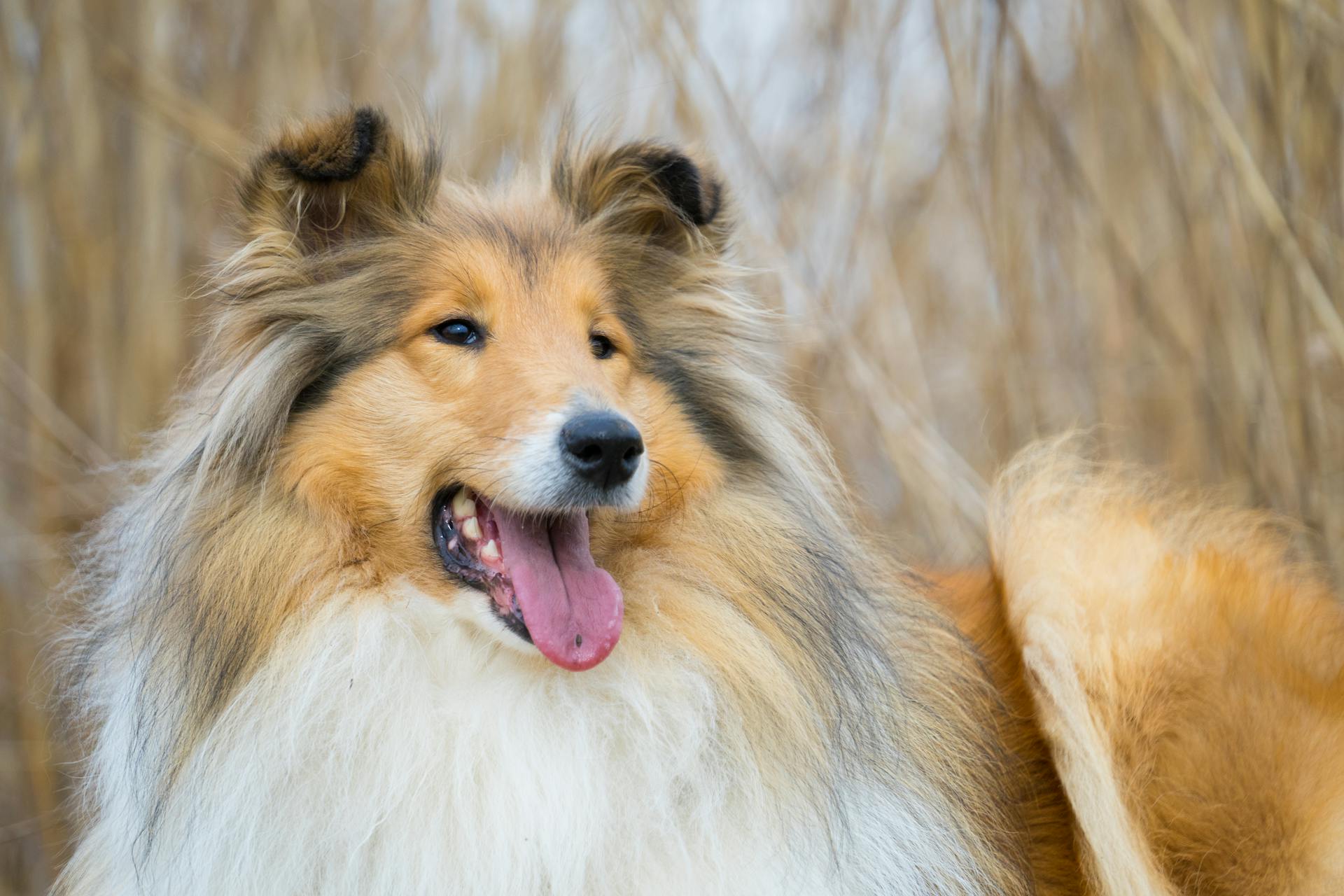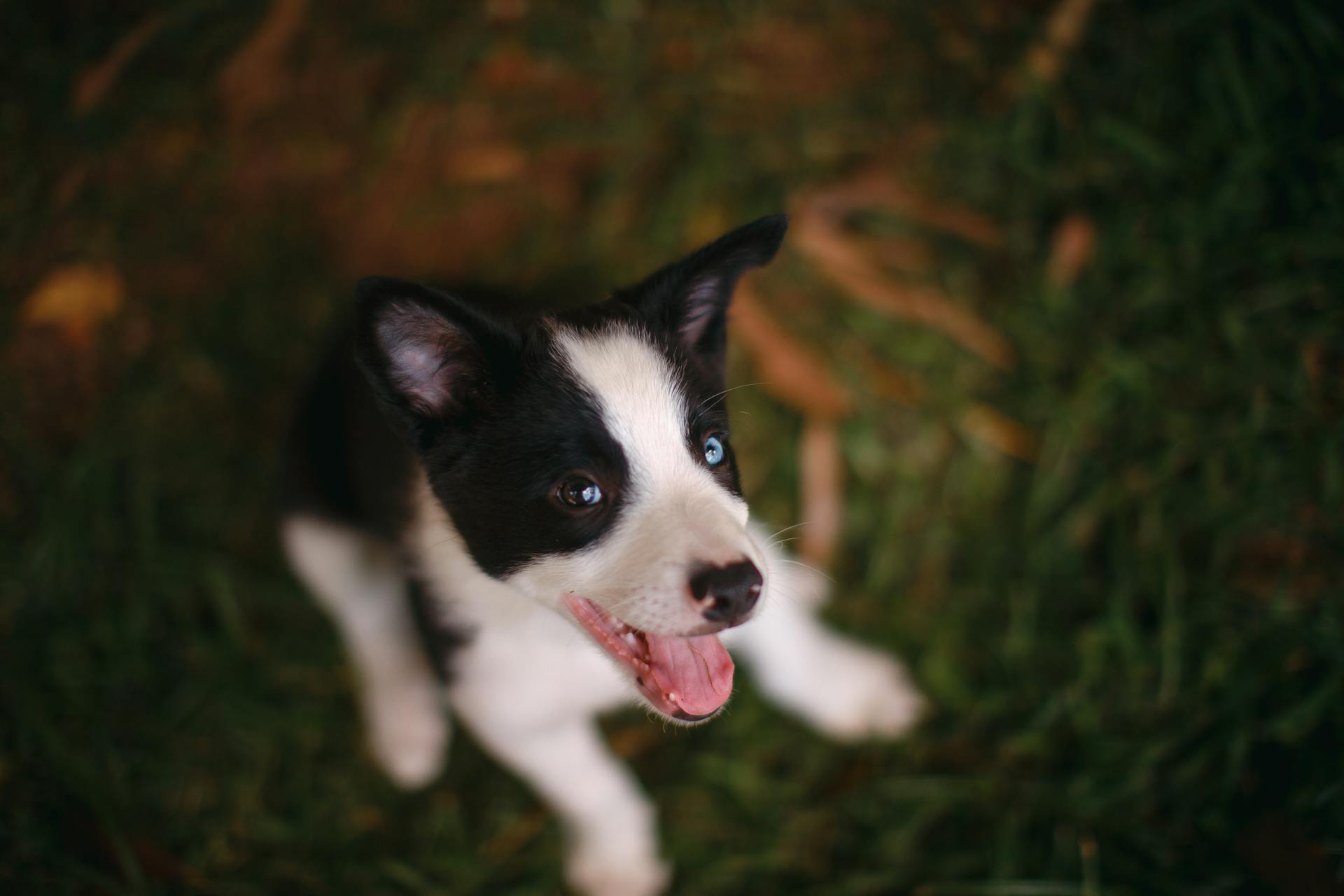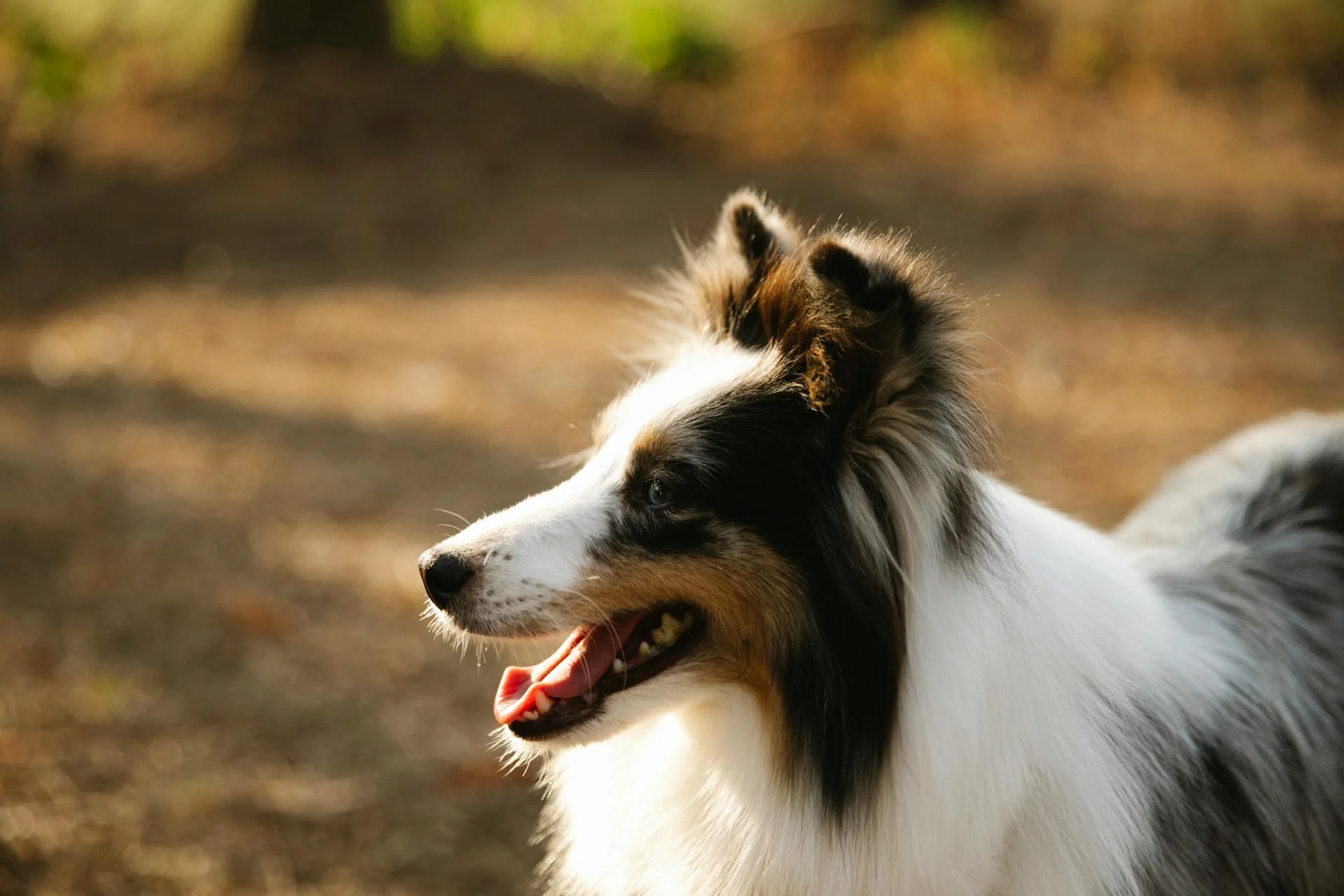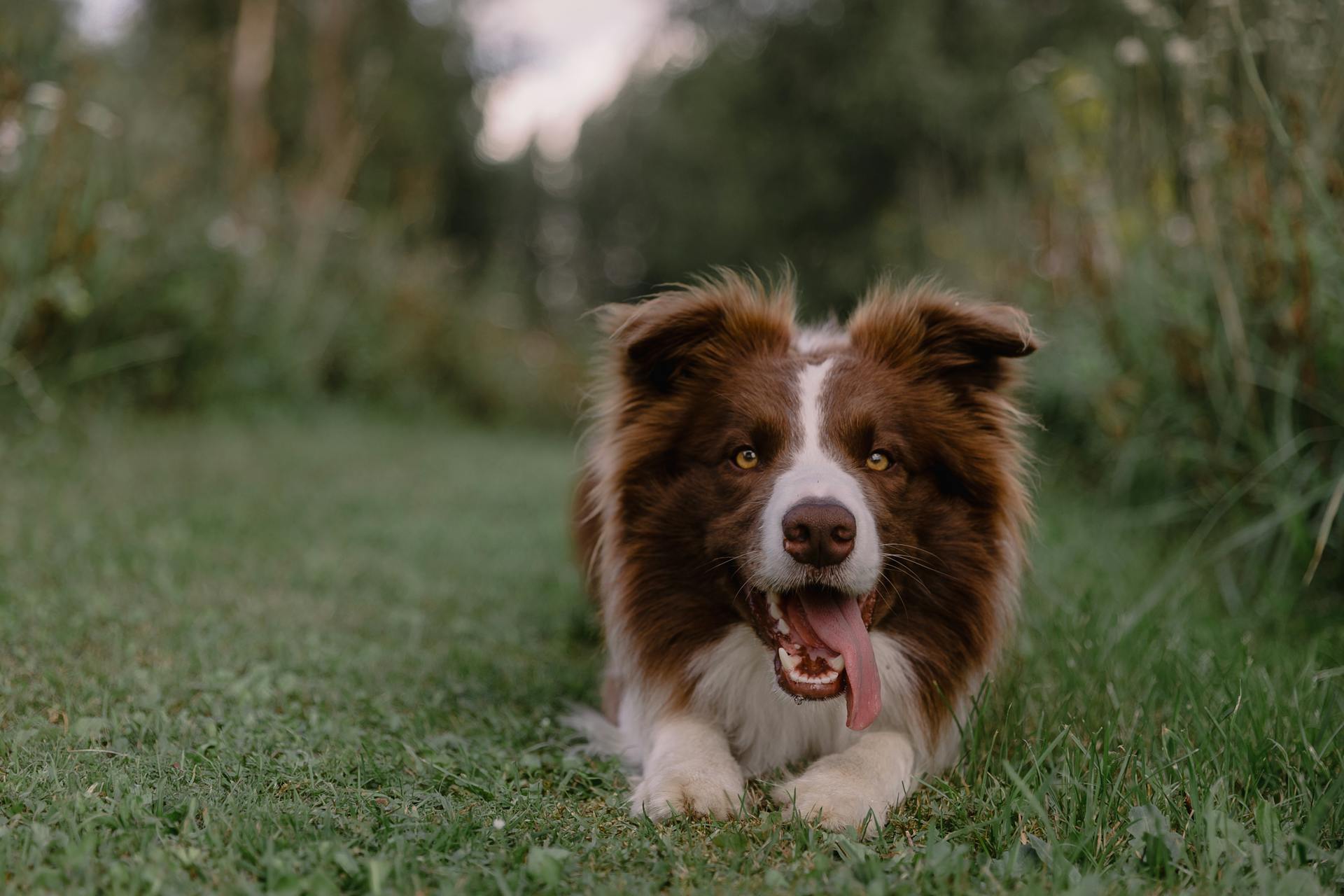
The collie is a breed that's hard to resist, especially with its association with the iconic Lassie. Collies are highly intelligent dogs that thrive on mental and physical stimulation.
Their intelligence is one of their most notable characteristics, ranking them among the top five most intelligent breeds. This means they can learn quickly and adapt to new situations.
Collies are loyal and loving companions, often forming strong bonds with their family members. They're known to be gentle and patient, making them a great choice for families with children.
Their short, dense coats require minimal grooming, making them a low-maintenance option for many dog owners.
Origin & History
The Collie breed has a rich history that dates back centuries. They originated in Scotland and Northern England as herding dogs.
Their name comes from the Scottish sheep (Colleys) they often watched. Collies were developed to herd sheep and other livestock.
The Collie breed was first illustrated in Thomas Berwick's 1790 book, A General History of Quadrupeds. This marked the beginning of their popularity.
Queen Victoria was a big fan of Collies and brought one back to England, promoting them to the public. This sparked others' interest, leading to many new breeders.
The American Kennel Club recognized the Collie as an official breed in 1885.
Breed Overview
Collies are a medium to large breed dog, weighing 50-75 pounds and standing about 2 feet high at the shoulder. They're a popular family pet, known for being lovable, intelligent, and loyal.
Originally, Collies were bred to herd sheep, cattle, and other livestock, which makes them very agile dogs with strong herding instincts. They're still used as working dogs in many parts of the world.
Collies are easy to train, which is great news for families with kids. They get along well with children and other pets, making them a great addition to many households.
Collies are very energetic and need plenty of exercise, so they're not the best fit for inactive families unless they live on a large farm. They thrive on the companionship of humans, especially children.
You might enjoy: Border Collies Good Running Dogs
Appearance and Coat
Collies have a wide range of coat colors and patterns, including sable and white, tricolor, blue merle, and color-headed white. The American Kennel Club accepts color-headed white, where the dog is predominantly white with colored markings on the head and sometimes body patches.
You might like: White Collies
Collies typically have a long, dense, coarse outer coat with a notable ruff around the neck, feathers about the legs, a petticoat on the abdomen, and a frill on the hindquarters. The downy undercoat is covered by this outer coat.
The size and weight of Collies can vary, with males standing 55.8 to 66 cm (22 to 26 in) at the shoulder and females averaging 5 cm (2 in) shorter. Males usually weigh between 50-70 lbs, while females weigh 5-10 lbs less.
Here are the four main coat colors of Collies:
- Sable & White
- Tri color
- Blue Merle
- White
Not All Have Coats
Not all Rough Collies have long coats. They can actually come in a variety of lengths, including short hair. This is a bit confusing, but it's worth noting that there's a specific variant called the short-haired rough Collie. Their fur is thicker than a Smooth Collie's, but still quite different from the typical long coat of a Rough Collie.
Take a look at this: How Long Do Collies Live
Coat Care
Collies have a beautiful coat that requires regular care to stay healthy and clean.
Daily brushing is a must to prevent mats and tangles, especially behind the ears and elbows.
The Collie's coat sheds twice a year, with the undercoat shedding being the most extensive.
You'll need to brush your Collie at least once a week, and more often during shedding season, to remove dead hair and prevent infection.
Unspayed females shed for 3 months after heat cycles, while spayed females have one big shed every year.
Male Collies tend to shed more around their birthdays than females, so be aware of your dog's birthdate to prepare for a big shedding period.
Collies require at least weekly brushing and monthly bathing, and may need professional grooming during blow-outs.
Rough Collies need daily brushing, while Smooth Collies only need brushing a few times a week.
You should not trim a rough Collie's coat, as it can interfere with their ability to regulate their body temperature.
It's essential to check your Collie's ears regularly for signs of infection, and clean them out as needed with a wet cloth.
Collies also need their nails trimmed at least once a month, unless they run on rough terrain frequently and naturally wear down their nails.
For another approach, see: Do Collies Shed
Health and Conditions
Collies are generally a healthy breed, but like any breed, they can be prone to certain health issues. Collie eye anomaly is a common inherited condition that can cause blindness, usually before age 2.
Genetic testing can help identify Collie eye anomaly, and it's essential for responsible breeding practices. A board-certified veterinary ophthalmologist can diagnose the condition at 5-6 weeks of age.
Collies can also inherit progressive retinal atrophy, which causes the retina in their eyes to degrade over time, leading to blindness. This condition is more common in older dogs.
Some Collies may possess the MDR1 gene, which affects how they respond to certain medications. If your Collie has this gene, their medication may need to be adjusted in some cases.
Hip dysplasia is another potential issue in Collies, although it's not as common as in other breeds. It occurs when the hip doesn't develop properly, leading to wear at an early age.
Here are some common health issues in Collies:
- Collie eye anomaly
- Progressive retinal atrophy
- MDR1
- Hip dysplasia
Personality and Temperament
Collies are highly intelligent and trainable, making them a joy to work with. They thrive on mental and physical stimulation, which is essential for their well-being.
Collies are naturally great with children and other animals, but they must be well-socialized to prevent shyness. Regular interaction with new people and pets will help them become confident and friendly.
They can be fairly vocal, but with proper training, they can learn to bark less. Some Collies are more prone to barking than others, so it's essential to address this issue early on.
Collies are loyal and loving, but they can be one-family dogs, meaning they may be protective of their family but not necessarily aggressive. They're excellent with kids and make great family pets.
Collies need plenty of physical exercise and mental stimulation each day, or they can become bored and destructive. A daily walk or playtime in the yard is a great way to keep them happy and healthy.
Collies are not naturally aggressive, but they may nip at ankles and heels when excited, a trait leftover from their herding days. With proper training, this behavior can be eliminated.
Collies are known for their herding capabilities, but they can also make great therapy dogs, agility partners, or simply beloved family pets. With the right training and socialization, they can thrive in any role.
A different take: Training Border Collie Puppies
Training and Behavior
Collies are loyal and affectionate dogs, which makes them a joy to train. They are known to thrive off consistent methods of training, and positive reinforcement is often the best approach.
Collies are notoriously easy to train, but they can quickly become bored if the training doesn't challenge them. To keep them engaged, it's essential to rotate training exercises, toys, and locations regularly.
Collies require training from an early age, and puppy socialization is crucial for their proper emotional development and intelligence. This sets the foundation for a well-rounded personality.
As Collies bond with their family, they may become protective around strangers or other animals. However, they rarely growl or bite, and instead alert their humans by barking with intensity.
To prevent injury or loss, Collies need to be in a fenced area or contained when off leash. Their independent and curious nature means they can easily wander off if not properly supervised.
Exercise
Collies are a high-energy breed that requires regular exercise to stay happy and healthy. They thrive on physical and mental stimulation, making them perfect for active owners.
Rough Collies, in particular, need moderate to extended daily exercise to stay fit and healthy. This can include long walks, running, or morning jogging, making them a great partner for runners.
A daily walk is a good starting point, but Collies are super playful and need some level of moderate activity each day to keep them from going stir-crazy. This not only keeps them from tearing up things around your home, but it makes them happier overall.
Collies are also intelligent and trainable, making them a great fit for dog sports like agility, obedience, and herding. They can compete in dog agility trials, obedience, conformation, flyball, tracking, and herding events.
In terms of exercise duration, Collies need a minimum of 2 hours a day of exercise, which should be more than a leisurely stroll. Brisk walks, jogging, and running are necessary for Collies to meet their energy needs.
For puppies, the energy requirements are higher, and they need two walks per day, usually one in the morning and one in the late afternoon. This helps prevent boredom and destruction when you're away, and they'll let you sleep through the night.
Here are some fun activities you can do with your Collie:
- Herding
- Obedience
- Agility
- Therapy
- Long walks and jogs
- Frisbee
Remember to pay attention to your dog's cues and adjust their exercise routine accordingly. If they're panting excessively or lagging behind, it's time to take a break or slow down.
Nutritional Tips
Collies are prone to skin and coat issues, but omega-3 fatty acid supplements can help keep their skin and coat soft, shiny, and healthy.
Always consult with your veterinarian before adding any new supplements to your Collie's diet to ensure they're safe and suitable. Omega-3 fatty acids also promote a strong heart, immune system, brain, and vision.
Large-breed dry dog food from reputable companies like Hill's, Purina Pro Plan, and Royal Canin is a great choice for Collies. These companies have extensive research and development departments, employ board-certified veterinary nutritionists, and base their diets in science.
Collies involved in high-energy sports like agility or herding may benefit from extra omega fatty acids to promote learning, decision-making, and memory. These diets also have the right protein levels to support healthy muscles.
Most Collies do well eating two meals a day, typically at breakfast and dinner time. However, some Collies may be over-enthusiastic at feeding time and rush their meal, leading to stomach upset and other serious stomach conditions.
A slow-feed bowl can help slow down Collies who tend to eat too quickly, reducing the risk of stomach upset and bloat.
Discover more: Smooth Collie Temperament
Compatibility and Ownership
Rough Collies are a great breed for first-time dog owners, as they're very friendly and easy to manage day-to-day.
They're fun, loyal, and easy to train, making them a great fit for those who are just starting out.
Rough Collies can live with cats, but they may try to herd them, so proper training and socialization are essential.
Introductions are key when bringing a new dog into the household, and a slow introduction plan can help prevent confrontations.
Rough Collies are usually friendly and affectionate, making them a great breed for families with small children.
They're also gentle and sweet with children of all ages, which is why they're considered a great breed for kids.
Rough Collies are social dogs and get along well with other dogs, making them a great fit for households with multiple pets.
They're fairly calm and happy to play with other dogs, and they enjoy sharing their toys with them.
Take a look at this: Are Border Collies Good with Other Dogs
Wrapping Things Up
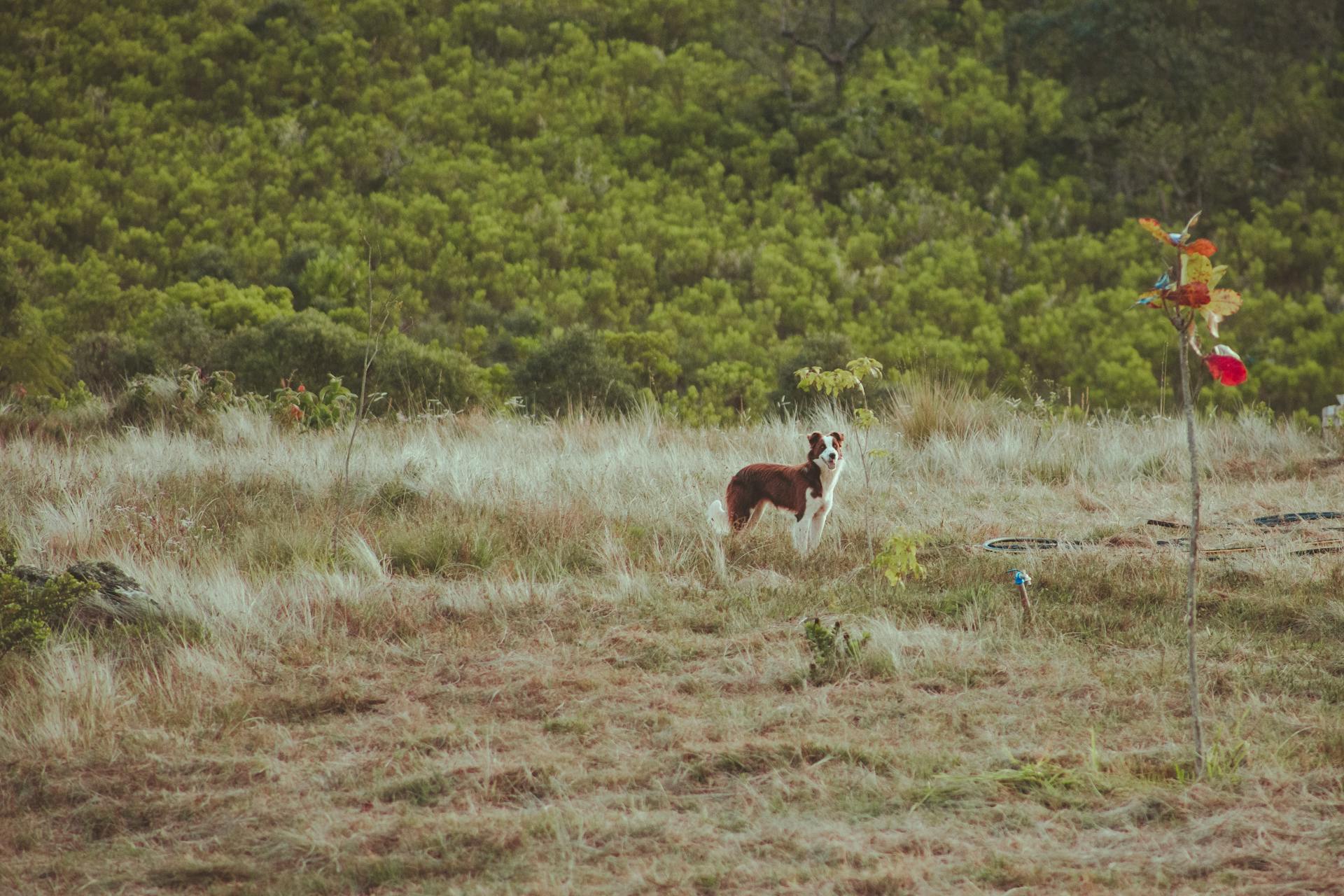
If you're considering getting a dog, it's essential to think about their grooming needs. Rough Collies, for instance, require regular grooming to manage their double coat and prevent excessive shedding.
Rough Collies are a great choice for families due to their friendly and active temperaments. They can also make excellent watchdogs.
Remember, owning a dog is a big responsibility, and it's crucial to research the specific needs of the breed you're interested in.
Broaden your view: Rough Collie Grooming
Pet Compatibility
Rough Collies are generally a great breed for families with small children, as they're very friendly and affectionate.
They're easy to train, which is vital for teaching them how to behave around kids. This makes them a great choice for first-time dog owners or those who are just starting.
Rough Collies usually get along well with other dogs, they're fairly calm and happy to roll around with other dogs and can make new friends quickly.
However, they can become bored easily, leading to destructive behaviors if they don't receive proper mental stimulation.
They're best suited for homes with yards, but they can also live in apartments with frequent walks. If you're active and want a dog, you can take them with you on outdoor strolls.
Rough Collies can live with cats, though they may sometimes try to herd them. Training and socialization can help prevent confrontations.
Introductions are essential when bringing a new dog into your home, especially if you already have a Collie. Use a slow introduction plan that sets everyone involved up for success.
A unique perspective: Border Terrier Life Expectancy
Owning Essentials
Having the right tools for the job is crucial, and a good router is essential for any network setup, as seen in the article section on "Network Essentials".
A reliable router can handle multiple devices and provide a stable connection, making it a must-have for any home or office network.
The cost of a router can vary greatly, from under $50 for a basic model to over $200 for a high-end device, as mentioned in the article section on "Budget Considerations".
You don't need to break the bank to get a good router, but investing in a mid-range model can provide better performance and features.
A good router can also improve your Wi-Fi signal strength, extending its reach to cover more areas of your home or office, as discussed in the article section on "Wi-Fi Range and Coverage".
This can be especially useful for large homes or offices with multiple floors or rooms.
It's also essential to consider the number of devices you'll be connecting to your network, as this can impact your router's performance and overall capacity, as seen in the article section on "Device Compatibility".
A good rule of thumb is to have at least 1 Mbps of bandwidth per device for smooth performance.
Additional reading: Do Border Collies Get along with Cats
Herding and Work
Collies have been bred for centuries as sheepdogs in the Scottish highlands, where they were used for herding and guarding.
They're still capable of being keen herders today, making them a great fit for owners who work with livestock or keep a few animals as a hobby.
Collies are naturally inclined to herding, and their trainability, adaptability, and loyalty make them well-suited for this type of work.
Local herding clubs offer clinics, work days, trials, and tests for Collies and their owners, providing a great way to learn and participate in herding activities.
These clubs also offer herding title programs, which Collies regularly participate in, showcasing their natural instinct and ability to herd.
Herding
Collies have a long history of herding in the highlands of Scotland, where they were bred to assist their masters in herding and guarding their flocks.
Their natural herding instincts make them well-suited for this work, and they can be trained to herd a variety of animals, including sheep, goats, and ducks.
Participation in herding helps preserve the special heritage of the Collie breed and opens up new opportunities for owner and dog.
Collies are capable of being keen herders while remaining sensible, flexible family companions.
They are well-suited for homes with yards, but they can also live in apartments with frequent walks and outdoor strolls.
In fact, many owners take their Collies with them on hikes and outdoor adventures, where they can get the exercise and mental stimulation they need.
Collies are also great at herding children, but it's essential to teach kids how to react properly by standing still and not running, as their herding instincts can sometimes lead to nipping.
The qualities that make a good herding dog, such as trainability, adaptability, and loyalty, are also important in many other areas, making the Collie an outstanding companion.
Guide Dog
Guide dogs are highly trained to assist individuals with visual impairments, and they're a perfect example of herding in a non-traditional sense. They're trained to navigate through crowds and obstacles with ease.
These dogs are typically Labradors, Golden Retrievers, or German Shepherds, which are all breeds known for their strong herding instincts. They learn to follow specific commands and navigate through tight spaces.
Guide dogs are trained to stop at curbs, avoid obstacles, and even detect changes in elevation. This is crucial for their handlers who rely on them for daily mobility.
Their training is rigorous and starts from a young age, with an emphasis on socialization and obedience. This foundation is essential for their future work as guide dogs.
Their ability to focus and work in distracting environments is a testament to their herding nature, which allows them to stay on task even in chaotic situations.
Frequently Asked Questions
Is Lassie a Collie?
Yes, Lassie is a fictional Rough Collie dog. She originated from a 1938 short story by Eric Knight, featuring a real-life breed of dog known for its intelligence and loyalty.
How many Collies played Lassie?
Nine male Collies played the iconic role of Lassie in various films and TV series. Despite being a female character, all the dogs that portrayed Lassie were males.
How long do Lassie Collies live?
Collies typically live for 12-14 years, but with proper care, they can outlive this expectancy.
Featured Images: pexels.com
